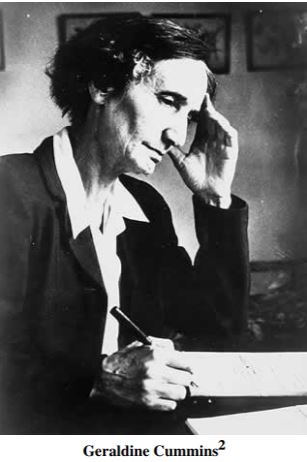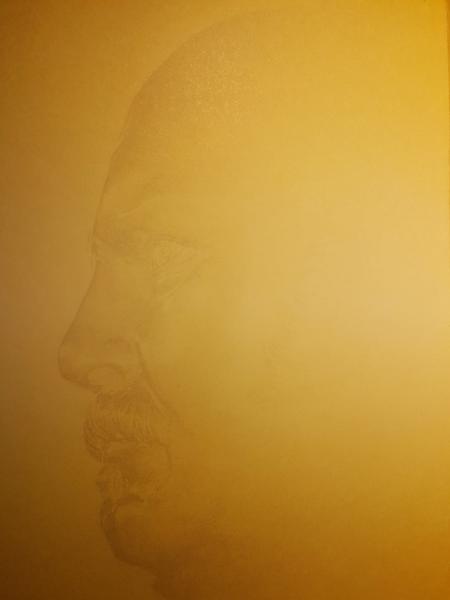Feuds and Regrets in Afterlife
Feuds and Regrets in Afterlife
By Michael Tymn¹
 The story of the Ross sisters, as communicated through the mediumship of Geraldine Cummins, perhaps the most accomplished automatist of the 20th Century, suggests that family grudges and feuds carry over into the afterlife if not resolved before death. The story also suggests that we can have concerns and regrets relative to how things, such as wills, were left at the time of transition from the physical world.
The story of the Ross sisters, as communicated through the mediumship of Geraldine Cummins, perhaps the most accomplished automatist of the 20th Century, suggests that family grudges and feuds carry over into the afterlife if not resolved before death. The story also suggests that we can have concerns and regrets relative to how things, such as wills, were left at the time of transition from the physical world.
Beatrice Gibbes, Cummins' friend and assistant, described the method employed by Cummins. She would sit at a table, cover her eyes with her left hand and concentrate on "stillness." She would then fall into a light trance or dream state. Her hand would then begin to write. Usually, her "control," most often a spirit named Astor, said to be a pagan Greek when alive on earth, would make some introductory remarks and announce that another entity was waiting to speak. Because of Cummins' semi-trance condition and also because of the speed at which the writing would come, Gibbes would sit beside her and remove each sheet of paper as it was filled. Cummins' hand was quickly lifted by Gibbes to the top of the new page, and the writing would continue without break. The handwriting most often changed to that identified with the communicating spirit when alive.
From 1925 thru 1929, Molly Ross, the youngest of four sisters and the only surviving one (age 45 in 1925), had nine sittings with Geraldine Cummins (GC). Gibbes observed and recorded the story in a book titled They Survive. After the sittings, Gibbes would go over the scripts with Molly and have her comment on evidential points.
Molly had three sisters who had passed over. They were Audrey, who died in 1894 at age 21; Margaret, who died in 1925 at age 57, and Alice, the oldest of the four sisters, who died in 1928 at the age of 62.
Molly had had several evidential sittings with GC after Margaret's death in 1925. After Alice appeared on the brink of death while in a nursing home in York, Molly, who was living in London, was summoned to her sister's bedside. After Alice died on October 11, 1928, Molly wired GC in Dublin, Ireland, requesting that Astor find her oldest sister, Audrey, and to let her know that Alice had passed over.
Four days later, on October 15, Molly received a letter from GC, postmarked October 12, saying that Margaret had communicated and said that "Alice was not alone when she was slipping out of her body...that Audrey and Mater (their mother) came to her."
Margaret explained that Audrey presented herself to Alice as Alice remembered her in 1894, not as she was in 1925. She further explained that because Alice and Mater had quarreled before Mater's death three years earlier, and because Audrey had much more experience on that side, Audrey was the first to appear to Alice while Mater remained in the background. Because Alice was so restless, Audrey put a dream of old days about her soul. When Alice saw these old memories, her fear left her. Margaret said that she had not yet approached Alice because she was not yet fit to draw near the newly dead. Besides, Margaret added, she would not have been received kindly by Alice as they constantly quarreled when they were alive. This point was particularly evidential to Molly, since it was true and she was certain that GC had no way of knowing of the friction between the two sisters.
On November 10, 1928, Molly sat with GC in London. A request was made to Astor to find Margaret. After a pause, Margaret took hold of GC's hand and told Molly that she had talked with Alice. "I had quite a shock when I found out that we didn't disagree with each other," Margaret wrote. "She is so much gentler than she was." Margaret then said that Alice would attempt to communicate directly, although it might be too soon and her words might be muddled. Molly observed the writing change to a big scrawl and become very labored.
Mo, Mo, Molly. I am here. I see you," Alice wrote. "It's all true. I am alive. The pain went at once. I felt suffocating. Then, just after I got that awful chocking, I felt things were breaking up all about me. I heard crackling like fire and then dimness. I saw you bending down with such a white face and you were looking at me, and I wasn't there." Alice added that she regretted that her husband, John, and her son, Ronald, were not there when she left the body. Molly confirmed the deathbed scene as accurate and pointed out that John and Ronald arrived several hours after the death. Here again, Molly saw this as very evidential since GC had no way of knowing what took place in Alice's final hours.
Alice said that she regretted not having treated her second son, who was living in East Africa, as an equal to Ronald. Molly confirmed that Ronald was the favorite son and noted that Ronald was favored in Alice's will, another fact which GC could not have known. As the writing became fainter, Margaret took back the pencil and explained that Alice found it hard to write at the end as she didn't understand how to manage the words. However, she got through most of what she wanted to say.
Margaret added that Alice also regretted treating her husband badly. Molly noted that this was also very evidential as Alice "bullied her husband dreadfully." Margaret then mentioned that Alice still resented the fact that Margaret cut her out of her will and left her share to Charles, their brother, who had no need of the money. This was another very evidential fact to Molly. "She hasn't forgotten yet the way I left my money," Margaret wrote. "She feels it would have made a difference in her last days."
Molly told Margaret that Alice's family was managing financially. "Good," Margaret replied. "I will tell her that, then she won't bother about things. The fact of the matter is, she came out of the world with a dark cloud of years of troubled thought about money. It all accumulated and clung about her. But I think now it will be slowly dissipated...All that worrying before her death left her in a very scattered state of mind." When Margaret told Molly that Alice had it easier than she (Margaret) did, Molly requested an explanation. "I never cared much for anyone," Margaret responded. "One pays for that over here."
Margaret went on to say that she was now "quite clear" of her worldly longings and had built herself a house with her thoughts. Moreover, she was sharing the house with someone. "Oh! I don't think that sounds quite nice," Molly reacted. "Who are you sharing it with? A MAN?" Margaret said she was not prepared to tell Molly of her companion, but, apparently in jest, wrote that she should tell Charles (their brother) that she had dragged the Ross name into the mud. Molly noted that it was a family joke that Charles took life too seriously and was always afraid of a family scandal.
On November 11, 1928, Molly again sat with GC. After GC went into a trance, Molly asked Astor if he could bring her sister, meaning Margaret. "Yes, I will call her," Astor responded, apparently thinking of Alice. "She is quite near. Her new body is now almost formed. When it is complete she can face the new world and this life. Wait (pause).
"Funny old man called me," Alice wrote, "Who is your grey-bearded admirer, Molly?"
Molly explained that the man was Astor, GC's guide. Alice replied that her mind was still in tatters and that she was confused. Alice then wrote that her men were no good. Molly replied that there were many men she liked in her younger days. "They were nice to flirt with but not any use otherwise," Alice wrote. Molly noted that Alice, when alive, frequently referred to herself as a "flirt."
Alice then said that Mater sends her love to Molly and talks about her (horseback) riding. Alice then recalled a quarrel that she had had with Mater over Molly's ability to ride a particular horse. Another evidential fact.
Alice mentioned that Margaret had been around. "You know I never could stand her," Alice said, "but you would have laughed to see us together. We were so polite. She was trying so hard to avoid giving offence... I put Margaret in her place all right. She told me how sorry she was about her will and the money she didn't leave to me. I told her that being sorry didn't make up for the thoughtlessness, that there was more thought in your little finger than in her whole body. Do you know, she took it quite quietly, and would you believe it, kissed me! My word, I was never so taken back in my life. I couldn't say anything more to her then."
At one point, Alice said, "And in those last months I used to keep saying to myself, ‘if only this or that had happened.'" Molly recalled her saying those exact words.
Alice also mentioned having talked with their father (Pater) and his making reference to some "numbskull" relatives. This was a word that Alice sometimes used when alive, Molly noted, while Beatrice Gibbes could not recall GC ever having used the word before.
Alice asked Molly if she had seen John (Alice's husband) recently. Molly said she had. "Tell him I see more and more how patient and good he was to me," Alice wrote. "I feel so sorry now because I know I spoke harshly to him sometimes." Molly noted that "harshly" was a very mild way of putting it.
After a few more comments the writing changed to Margaret's quick style. Molly asked Margaret if she was aware that Alice was just communicating. "Yes, she has quite blossomed out,"
Margaret replied. Molly noted that Margaret frequently spoke of people "blossoming out" when she was alive in the flesh. Margaret mentioned that she and Alice had had a "fusillade" (i.e., shoot-out, outburst) when they last met. Molly recalled that the word "fusillade" was often used by Margaret before she passed.
On the following day, November 12, Molly returned for another sitting with GC. Astor announced that both Margaret and Alice were there. "You mustn't mind too much what Alice says to you," Margaret opened the dialogue. "She is still very much in the cloud of her memories. She feels, however, that things are not so bad here now. At first she found fault with so many different aspects of life in this place between the worlds. There is a kind of intermediate state, you know. If only human beings would talk to their people when they are in that state it would give such comfort...I had a difficult time, but it is over now. You did help me."
Molly again asked Alice about her housemate. "You would laugh at me if I explained," Margaret replied. "We have to go through certain essential experiences, and if we miss them in the earth-life we may have to face them here. I have actually to share a house - not a bed - with a man (laughter). Quite true."
Molly asked if she were joking. "No, I am not," Margaret answered. "I don't mean anything improper. I merely mean I have to put up with a companion of another type of mind. Here we talk of men and women, but we really mean male and female minds. I have to put up with the masculine type of mentality in my home. Heavens! It is trying sometimes!"
Margaret said that her masculine companion has a "very untidy mind," which she was having a hard time adjusting to. "You know we make our homes out of our memories. I like a nice little house. He wants a house that is quite unlike anything that was ever built or imagined. You can't imagine all his absurd, impossible ideas. How would you like to come home to your cozy little sitting room and find that it had been turned into a great hall; that it has curious lights in it, and no ordinary furniture?"
The writing changed and the pencil tapped the paper in an agitated manner. "I get so impatient," Alice communicated after fumbling with the pencil.
Alice told Molly that Audrey had taken her on a trip to the south of France. "I was hungry for it," Alice explained. Molly noted that Alice, when alive, had longed to get away from England and spoke of getting away to the South of France. Alice also wrote about being approached by a man who claimed to be her brother. However, Alice was confused as she had, to her knowledge, no brothers on that side. When Molly reminded her that their mother had a stillborn baby before she (Alice) was born, Alice recalled the story.
"Oh! I understand now," Alice said. "Audrey left me with him and didn't explain. He said he was living quite close to Margaret, that she didn't know he was her brother. He explained that he had charge of some man who came over to this life, not so very long ago, and his punishment was to live with her. Her punishment was to live with him. Did you know that there was a kind of twist in poor Margaret's soul and so she had to get it straightened out by living with her opposite?"
Alice added: "You don't have sex business over here. It is something different. Margaret has to learn to live with some other people." Alice also said that she doubted Molly, who had never married, would have to go through such an experience because she had not "grown inwards like a bad corn." Molly noted that this was also a typical expression of Alice's when alive.
The discussion returned to Charles, the brother who had received Alice's share of Margaret's money. "...I feel so furious with Charles still," Alice penciled. "I don't want to risk his ever knowing... He is an odious man." Molly clearly recalled Alice referring to Charles as an "odious man" on numerous occasions when in the earth life, seeing this as extremely evidential.
As the pencil rushed across the paper and the words became confusing, Astor broke in and said that lady was very excited. He told her to have patience. Alice complained that the "butler" was very rude, apparently referring to Astor. Molly recalled that Alice had always been very impatient with her servants.
Molly asked Alice what she had been doing with her time. "I was taken to a land like the earth in some ways but very different in others," Alice responded. "For instance, you see rocks, trees, houses, about you, but if you choose to close your outward eyes and use another part of you that can perceive, you see right through these rocks, trees, houses, and solid earth. They tell me here that even while you are on earth, if you practiced them from childhood closing the outer eyes and willing hard to see with the eyes of your inner body, everything also would become transparent to you. And you would see other strange things." Molly asked about Margaret. "Oh! I've no patience with her," Alice wrote... My dear, she is so stupid, still." Molly noted that Alice always complained of Margaret's stupidity. "She is just planted there in her wretched house, trying to pretend she is living just as she did on earth, which is such nonsense," Alice continued. "It is just as if I had pretended all my life I was a baby in a nursery and kept on sucking a bottle. Margaret is still sucking her baby bottle and she whines for her baby comforter. Why, I am already far ahead of her, though I have been here such a short time."
Alice said that had she known what it was like on that side when she was on earth, she would not have bothered so much about dinners and overdrafts. Molly recalled that Alice was frequently worried about overdrafts.
The sisters began to discuss Alice's dog. As Alice tried to write the name of her dog, Patricia, she wrote "Patsey, Pitri-e-" and then "STUPID," after which the pencil was flung violently down. After things quieted down, Alice apologized and said she could not get the hand to write properly.
Molly's next sitting was on March 26, 1929. Astor asked Molly to wait while he found her sister. After fumbling with the pencil, Alice began writing in her broken and uneven calligraphy. She informed Molly that Margaret was giving her a hard time and requested that she mediate. "She is just as mulish as ever," Alice wrote. Molly recalled Alice using that word many times in describing Margaret.
"You know what she's like," Alice continued. "She's just the same. Wants everything to be run in her way, by rules and regulations. I told her she was the real trouble. That her nagging about this and that was bad for the Mater." Molly also recalled Alice's frequent use of the word "nagging."
After a pause, Margaret communicated and complained about Alice. "She is just the same. She hasn't changed a bit. You remember how she used to carry all before her, sweep everything aside to suit herself; behave as though she were the only person in the house to be attended to. Of course, you were so young when we were together in the house you can't remember how spoiled and impossible she was. Well, she has simply taken possession of the Mater. She behaves as if she were mistress of everything. She tries to prevent my seeing her. She won't let me tell the Mater about my own little difficulties... And when she is coming out in the old colors again I think it is high time she was put in her place. Molly recalled Margaret frequently saying "coming out in old colors again" with regard to Alice.
Molly suggested that Margaret try to get on better with Alice and she might then gravitate to happier conditions. Margaret said that she would think it over, then wrote that she would say a few nice words to Alice, after which Alice would speak. "She is so silly, you know," Margaret ended. "She boasted to the mater that she had managed to get married and that I hadn't, and had done nothing with my life." Molly noted that Alice used to taunt Margaret about not being married and doing nothing with her life.
After a pause of about a half-minute, the pencil tapped and Alice's peculiar writing began. "I thought you would do it, Molly," Alice wrote. "She has apologized to me...she saw how much she was in the wrong. I shall get real peace and happiness now if Margaret really does leave the Mater to me..."
Alice went on to tell Molly that her new body has been growing and changing. "You would be surprised if you saw it. I have grown so much younger. It gives me pleasure to look and feel as if I were in the twenties again.... Perhaps Charles and I will have to live together. HOW HEAVENLY!" Molly noted that Alice often used this expression in jest. It was written in extra large letters.
On March 28, Molly again sat with GC. She asked Astor if she could speak to her two weird sisters. "They have, during their life on earth, impregnated their ever-growing etheric doubles with the spirit of antagonism for each other," Astor communicated. "My friend, you sow the seeds of another potential existence here. You need not be too troubled about them. Slowly this warp in their being will be straightened out. But at the moment, when they meet, they respond to old, deep antagonisms. I will summons them."
Margaret communicated first and said that she had told Mater she would not be seeing much of her in the future because Alice was jealous of her. "The Mater said the people one lives with can be the creation of our own minds; that I could make Alice a really lovable person by thinking her so all the time. Such nonsense, really." Molly noted that this was a phrase frequently used by Margaret. Molly asked how Pater was coping with the situation. "He seems only to be amused at what's happened," Margaret responded. "He isn't interested in either of us. His whole mind is fixed on some work he has here. He always was that way. Didn't bother about people." Molly confirmed this as correct.
After some other comments by Margaret, there was a pause and Alice returned and wrote that everything has been going well since Margaret left and that she has been visiting many old friends with Mater. She added that Margaret needed a "husband of the firm kind" to make her understand how to live. Molly noted that Alice often remarked that women needed "firm husbands."
The handwriting changed to that of Mater, who affectionately greeted Molly. Molly asked her what was going on with Alice and Margaret. "Oh yes, I was very upset about it," Mater replied. "It reminded me of the old days when they quarreled and I could do nothing with them...You know I didn't see much of Margaret till Alice came. Then she used to visit us a great deal. At first, I was very pleased. Then I saw it was partly not to let Alice be the one and only. So silly, really." Molly noted that Margaret was not particularly fond of her mother when alive, and it was very like her to try and upset arrangements under the circumstances as described.
Mater explained to Molly that Alice, being newly arrived, needed her attention more than Margaret did. "I am happy because I know I am able, in this way, to help her to happiness. I don't mind her taking control of everything. I won't restrain her now. I will let her give her own nature full play. Later she will begin to learn, and will change. At present what is essential is that she should be content after her long discontent, as it would be fatal if she became warped or embittered."
Mater added that Margaret is much harder to help because she hates change, and she is naturally indolent.
Because of pressures of other work and also because GC had been in Ireland for several months, Molly did not sit with GC again until September 29, 1929. Molly told Astor that she would like to talk to her two strange sisters. After a pause, Margaret began writing. She mentioned that she had been around Molly several times during the summer and was glad that she was able to spend some time with John (Alice's husband). "You can be very sympathetic," Margaret wrote. "He never met with that in his married life anyway." Molly noted that she had visited John several times and what Margaret said was for the most part true.
Molly asked Margaret how she was doing. "Things are getting brighter for me," Margaret replied. "Alice taunted me about not having friends here, so I thought I would show her that I had my own circle. So, though I didn't like doing it at all, I looked up strangers. I tried to make the acquaintance of quite unprepossessing people. The result is, I have made my circle now, but it wouldn't have been made if it hadn't been for Stephen. You don't know him. He is the man I loathed so much, who had to live with me here. Well, he isn't so bad after all, though he does upset me still; he is so unmethodical and untidy. Anyway, he quite understood my point of view about Alice, and agreed that I must show her that I can manage very well for myself, and lead a happy, successful life. So first he brought in his friends. Some were dreadful people, and I would have had nothing to do with them if it hadn't been for the thought of Alice. But the finny thing was, that after I had got to know them, they didn't see so dreadful after all. Do you know, Molly, I believe I made a great mistake in life. I shut myself away from people too much. I am afraid I was rather self-centered. I have only just been getting to know how kind people can be, and though Stephen and I have rows sometimes still, I am beginning to see that he means very well and isn't out to deceive me or do me."
Margaret asked Molly if she would come to live with her when it was her time to cross over to the other side, but Molly said she would have to see what conditions are when she gets there. Molly then said that she would like to talk to Alice.
"May I say that I think you are very foolish to talk to Alice?" Margaret replied. She will only weary you with her temper, but of course, if you want to have a row with her, you can...I could tell you a great deal about travel here if you talk to me. Most interesting. The worlds you can visit, the states you can enter....."
But Molly rejected the offer and asked that Alice be allowed to take over the hand. There was a pause and the untidy broken handwriting of Alice began. "Stupid. This hand is idiotic," Alice wrote as she struggled to take control of GC's hand.
"Molly dear, I can't tell you how wonderful it is not to have to be cook, housekeeper, charwoman and nurse to John, all combined," Alice wrote. "Don't tell him I said that. I know he did his best."
Alice went on to say that when John comes over she will leaver Mater and make a home with John since he would never be able to look after himself there. "He seems to be able to look after himself now at any rate," Molly told Alice. "I don't think you need bother."
But Alice insisted that she wanted to be with John again. When Molly said she didn't seem to appreciate him when she was on earth, Alice agreed. "I know I didn't. I have grown to want John again. It was the reverse on earth."
When Alice attempted to ask about her dog, she again struggled with the hand. Beatrice Gibbes explained that GC did not like dogs and that any discussion of them somehow resulted in her organism being upset and thus difficulties arose.
"It would be difficult to attribute the production of the Ross scripts to the ‘subconscious activity' of Miss Cummins," Gibbes offered in concluding the case. "Her mind contained no reminiscences or associations upon which it could draw in order to successfully dramatize these very original ladies. That language employed is purely colloquial and there is no attempt to emulate the style of a particular author known to us. But there is the precise building up of curious and mundane personalities which were characteristic of certain deceased persons unknown to the automatist, but definitely claimed to be recognized by their surviving relatives."
Gibbes added that the writing did not bear any resemblance to GC's normal script and the phraseology was much different than that used by GC in her conscious state. Moreover, she concluded that the individuality of the spirit communicators made such theories as telepathy and Universal Memory highly unlikely.
Notes from the Editor:
¹ Michael Tymn is a writer and the editor of The Searchlight, a quarterly magazine published by the Academy of Spirituality and Paranormal Studies. He is also the Chairman of the Publications Committee of the latter, runs his own Blog at http://metgat.gaia.com/blog and is the author of a recent published and well praised book on the field of Psychical Research: The articulate Dead.
² Geraldini Cummins. This medium channeled other interesting books and among them we would like to mention: Road to Immortality and Beyond Human Personality. Both books were dictated by the spirit of Frederic W. H. Myers, the author of the classic book Human Personality and its Survival of Bodily Death, and one of the founders of the SPR-Society for Psychical Research. These books open with the following message:"For it has been my lot to be concerned in a work more important and more successful than anything in my own capacity or character could have led me to expect. I have been one of the central group concerned in a great endeavour; the endeavour to pierce, by scientific methods, the world-old, never-penetrated veil. The movement which took overt shape in 1882, with the formation of the Society for Psychical Research, was aided indeed by help from other quarters, but in its essential character was the conception of a few minds, and was piloted through its early dangers by a small group of intimate friends. With this endeavour to learn the actual truth as to the destiny of man I have from the very first been identified and, so to say, incorporate. Edmund Gurney worked at the task with more conscientious energy; the Sidgwicks with more unselfish wisdom; but no one more unreservedly than myself has staked his all upon that distant and growing hope. --Frederic Myers". The initiative known as Cross-Correspondence thouroughly examined at the SPR is alleged to be originated by the spirit of Mr. Myers, to eliminate the hypothesis of telepathy from spirit communications. The Brazilian spiritist writer Hermínio C. Miranda makes extensive references to the above books, in his excellent work of two volumes regarding mediumship and its practice, which bears the title of Diversidade dos Carismas - Chapter IV-Semiologia da Comunicação [Diversity of Charisms - Semantic of the Communications].
Source: The Spiritist Messenger, 17(112), 2009








